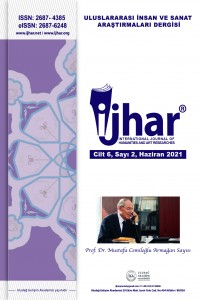Abstract
Padişahlara, devleti yönetenlere ve devlet idaresinde yönetilen halka yol göstermek, tavsiyelerde bulunmak gibi amaçlarla yazılan kitaplara siyasetnâme denilmektedir. Genellikle yol gösterici ve öğüt verici nitelikteki eserler olan siyasetnameler, ideal devlet yönetimi, ideal yönetici ve insan tipini oluşturmak amacıyla yazılmış eserlerdir. Müslüman Türk dünyasında 11. yüzyıldan itibaren görülmeye başlayan siyasetname türü eserlerin ilk Türkçe örneği Karahanlılar döneminde ya¬zılan Kutadgu Bilig’dir. Kutadgu Bilig’den üç yüz yılı aşkın bir zaman sonra kaleme alınan ve bu sahada ikinci olarak karşımıza çıkan telif eser, Şeyhoğlu Mustafa’nın Kenzü’l-küberâ ve Mehekkü’l-ulemâ’sıdır. Kenzü’l-küberâ’yı sonraki asırlarda pek çok mühim telif eser takip etmiş, bu eserler vasıtasıyla Osmanlı siyasi-ahlaki düşüncesi günümüze taşınmıştır. Osmanlı siyasetname geleneği içerisinde kaleme alınmış ve bugüne değin üzerinde herhangi bir ilmî çalışmada bulunulmamış siyasetname türü eserlerden biri de Tuhfetü’l-vüzerâ’dır. Eser, Süleymaniye Kütüphanesi Ayasofya Bölümü 2705 numarada kayıtlı bulunmaktadır. 1563 yılında istinsah edilmiş olan ve devrin karakteristik dil ve imla özelliklerini yansıtan Tuhfetü’l-vüzerâ, müellifi bilinmeyen bir eserdir. Eserde kırk bâb altında toplam yüz altmış öğüt yer almaktadır. Tuhfetü’l-vüzerâ’nın muhtevasında yer alan öğütlerin çoğunluğu kimi İranlı bilge şahsiyetler ve Antik Yunan dönemi filozoflarından aktarılmıştır. Bu makalede; söz konusu eser incelenmiş ve siyasetnameler üzerine yapılacak mukayeseli çalışmalara katkıda bulunması amacıyla eserin metnine yer verilmiştir.
References
- Adalıoğlu H. H. (2009). Siyasetnâme, Türkiye Diyanet Vakfı İslâm Ansiklopedisi, C. 37, s. 304-306.
- Altay, A. (2011). Klâsik Dönem Osmanlı Siyasetnâme Geleneğine Genel Bir Bakış, Turkish Studies - International Periodical For The Languages, Literature and History of Turkish or Turkic, Volume 6/3 p.1795-1809.
- Altuner, N. (2005). Şahin-zade El-Mar’aşi “Şeyh Ali Dilkesir’in Tuhfetü’l Vüzera” Adlı Eserinin Tanıtımı, I. Kahramanmaraş Sempozyumu Bildiriler Kitabı, C.1, s.143-155.
- Bilgin, A. (2017). Enîsü’l-celîs, Ankara: TÜBA Yayınları.
- Bursalı Mehmed Tâhir, Siyasete Müte’allık Âsâr-ı İslâmiyye, Kader Matbaası, 1330.
- Coşkun, V. (2008). Türkçenin Ses Bilgisi, İstanbul: Bilge Kültür Sanat Yayınları.
- Çolak, O. M. (2003). İstanbul Kütüphanelerinde Bulunan Siyasetnâmeler Bibliyografyası, Türkiye Araştrmaları Literatür Dergisi, Cilt 1, Sayı 2, s. 339-378.
- Ergin, M. (1989). Türk Dil Bilgisi, İstanbul: Bayrak Yayınları.
- Korkmaz, Z. (1973). Marzuban-nâme Tercümesi, Ankara: Türk Dil Kurumu Yayınları.
- Levend, A. S. (1962). Siyaset-nameler, Türk Dili Araştırmaları Yıllığı-Belleten, s. 167-194.
- Tekin, T. (1997). Tarih Boyunca Türkçenin Yazımı, İstanbul: Simurg Yayıncılık.
- Uğur, A. (2001). Osmanlı Siyaset-Nâmeleri, İstanbul: Millî Eğitim Bakanlığı Yayınları.
- Yavuz, K. (1991). Şeyhoğlu Kenzü’l-küberâ ve Mehekkü’l-ulemâ, Ankara: Atatürk Kültür Merkezi Yayını.
- Yılmaz, C. (2002). XVI. ve XVII. Yüzyıl Islahatnâmelerine Göre Osmanlılarda Siyaset ve Toplum Düşüncesi, Yayınlanmamış Doktora Tezi, Sakarya Üniversitesi Sosyal Bilimler Enstitüsü, Sakarya.
- Yılmaz, C. (2009). Siyasetnâme, Türkiye Diyanet Vakfı İslâm Ansiklopedisi, C. 37, s. 306-308.
Abstract
The books written to guide the sultans, the state's rulers, and the people governed by the state administration, and giving advice, are called siyasetname. Siyasetnames often guide and preach to people and are written to create the ideal type of state administration, ideal ruler, and human being. The first Turkish example of the genre of siyasetname that began to be seen in the Muslim Turkish world since the 11th century is Kutadgu Bilig written during the Karakhanids period. The second work, written about three hundred years after Kutadgu Bilig, is Şeyhoğlu Mustafa's Kenzü’l-kübera ve Mehekkü’l-ulema. Many essential works followed Kenzü'l-kübera in the following centuries, and through these works, the Ottoman political-moral thought has been carried to the present day. Tuhfetü'l-vüzera is one of the works written in the tradition of Ottoman politics and has not been done in any academic study until today. The work is registered in Süleymaniye Library, Ayasofya Section, number 2705. Tuhfetü'l-vüzera, which was copied in 1563 and reflects the characteristic language and spelling features of its period, is a work whose author is unknown. There are a total of one hundred and sixty advices under forty chapters in the work. Most of the advice in the content of Tuhfetü'l-vüzera was conveyed by some wise Iranian personalities and ancient Greek philosophers. In this article, the work in question has been examined and the text of the work has been included in order to contribute to the comparative studies to be made on the siyasetnames.
References
- Adalıoğlu H. H. (2009). Siyasetnâme, Türkiye Diyanet Vakfı İslâm Ansiklopedisi, C. 37, s. 304-306.
- Altay, A. (2011). Klâsik Dönem Osmanlı Siyasetnâme Geleneğine Genel Bir Bakış, Turkish Studies - International Periodical For The Languages, Literature and History of Turkish or Turkic, Volume 6/3 p.1795-1809.
- Altuner, N. (2005). Şahin-zade El-Mar’aşi “Şeyh Ali Dilkesir’in Tuhfetü’l Vüzera” Adlı Eserinin Tanıtımı, I. Kahramanmaraş Sempozyumu Bildiriler Kitabı, C.1, s.143-155.
- Bilgin, A. (2017). Enîsü’l-celîs, Ankara: TÜBA Yayınları.
- Bursalı Mehmed Tâhir, Siyasete Müte’allık Âsâr-ı İslâmiyye, Kader Matbaası, 1330.
- Coşkun, V. (2008). Türkçenin Ses Bilgisi, İstanbul: Bilge Kültür Sanat Yayınları.
- Çolak, O. M. (2003). İstanbul Kütüphanelerinde Bulunan Siyasetnâmeler Bibliyografyası, Türkiye Araştrmaları Literatür Dergisi, Cilt 1, Sayı 2, s. 339-378.
- Ergin, M. (1989). Türk Dil Bilgisi, İstanbul: Bayrak Yayınları.
- Korkmaz, Z. (1973). Marzuban-nâme Tercümesi, Ankara: Türk Dil Kurumu Yayınları.
- Levend, A. S. (1962). Siyaset-nameler, Türk Dili Araştırmaları Yıllığı-Belleten, s. 167-194.
- Tekin, T. (1997). Tarih Boyunca Türkçenin Yazımı, İstanbul: Simurg Yayıncılık.
- Uğur, A. (2001). Osmanlı Siyaset-Nâmeleri, İstanbul: Millî Eğitim Bakanlığı Yayınları.
- Yavuz, K. (1991). Şeyhoğlu Kenzü’l-küberâ ve Mehekkü’l-ulemâ, Ankara: Atatürk Kültür Merkezi Yayını.
- Yılmaz, C. (2002). XVI. ve XVII. Yüzyıl Islahatnâmelerine Göre Osmanlılarda Siyaset ve Toplum Düşüncesi, Yayınlanmamış Doktora Tezi, Sakarya Üniversitesi Sosyal Bilimler Enstitüsü, Sakarya.
- Yılmaz, C. (2009). Siyasetnâme, Türkiye Diyanet Vakfı İslâm Ansiklopedisi, C. 37, s. 306-308.
Details
| Primary Language | Turkish |
|---|---|
| Journal Section | Research Articles |
| Authors | |
| Publication Date | June 30, 2021 |
| Submission Date | May 1, 2021 |
| Acceptance Date | June 16, 2021 |
| Published in Issue | Year 2021 Volume: 6 Issue: 2 |




International Journal of Human and Art Studies İJHAR; Licensed under the Creative Commons Attribution 4.0 International License.
International Journal of Human and Art Studies IJHAR has been registered with the decision of the Turkish Patent and Trademark Office, numbered 71248886-2020/24446 / E.2020-OE-458377.


